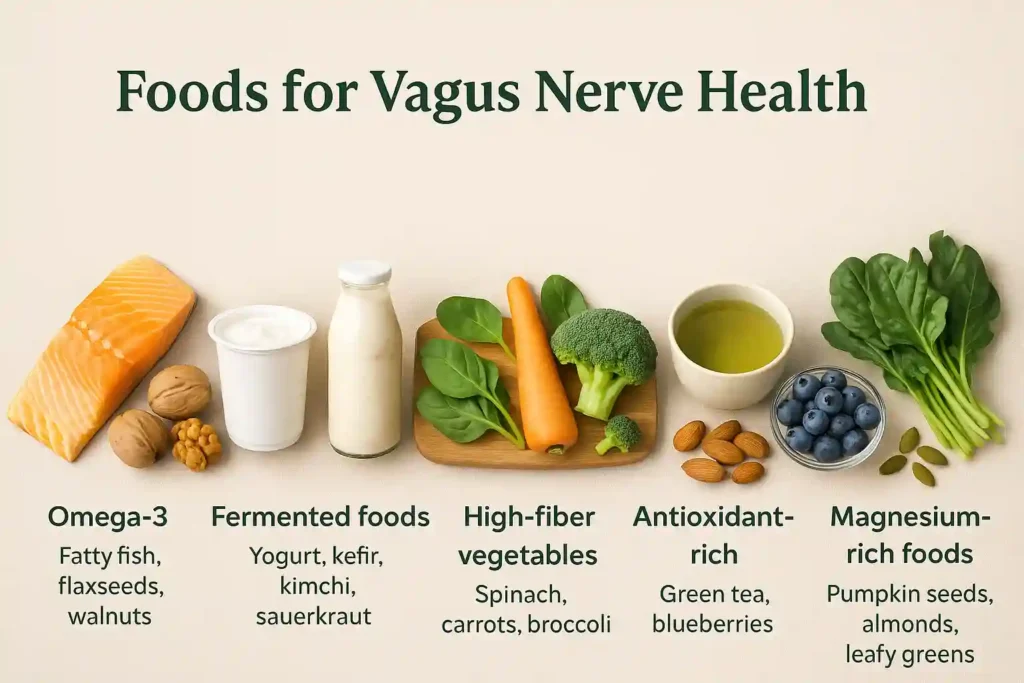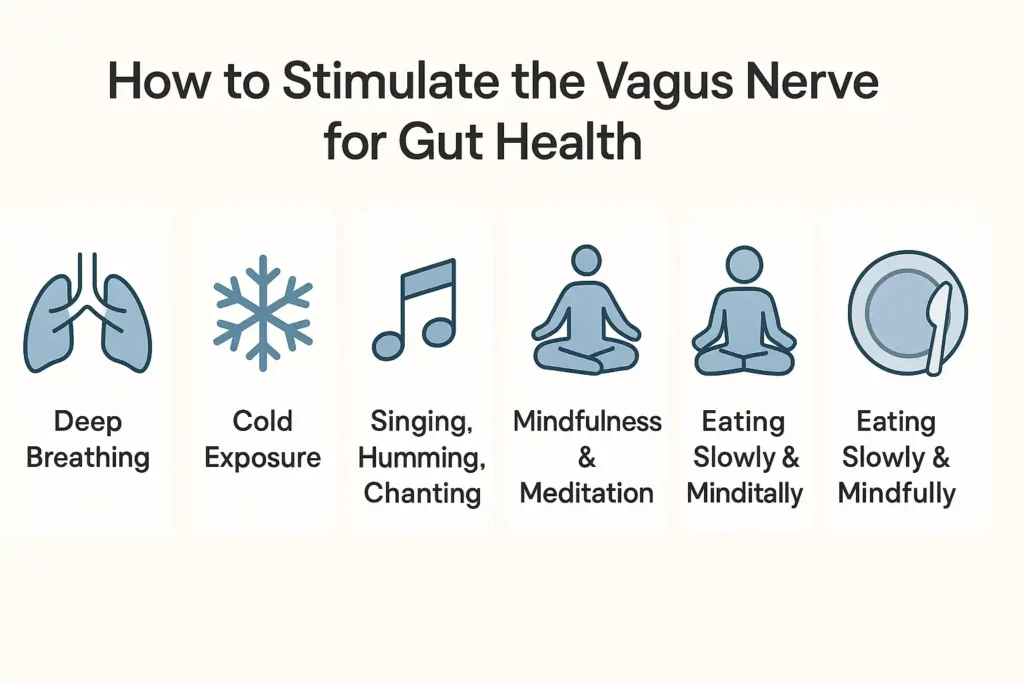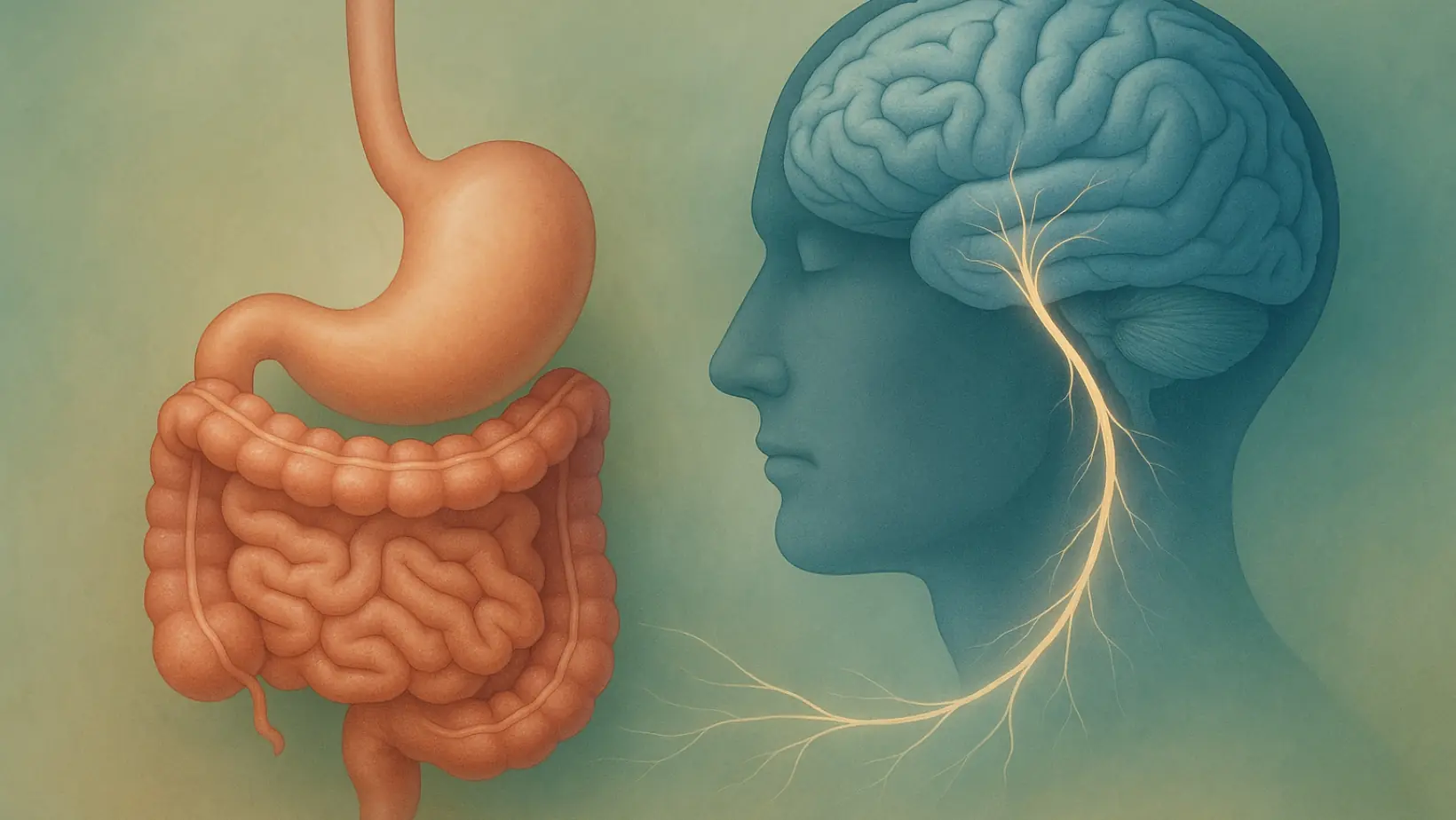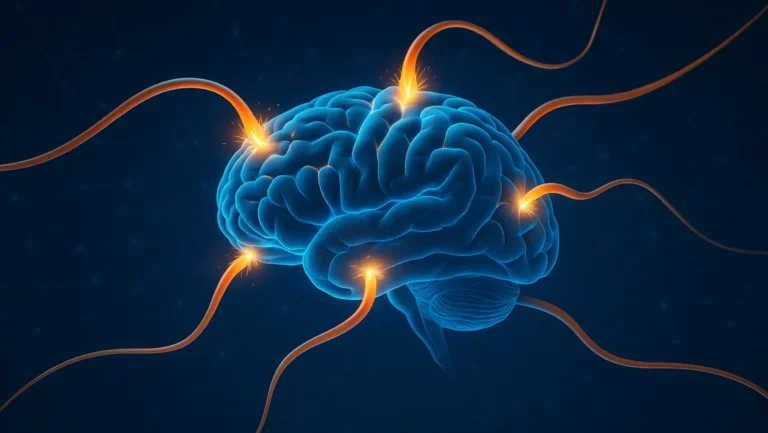TLDR: The Vital Role of the Vagus Nerve in Gut Health and Beyond
The vagus nerve and gut health are more connected than most people realize. This nerve acts like a busy highway between your brain and your digestive system, sending and receiving signals that influence mood, digestion, and even immunity.
A healthy vagus nerve helps maintain smooth digestion, a balanced mood, and better stress control. When it’s not working well, both mental and digestive issues can show up.
So…What Exactly is the Vagus Nerve?
The vagus nerve is the longest nerve in the body’s autonomic nervous system. The process begins in the brainstem, extends through the neck and chest, and penetrates deeply into the stomach and intestines. Think of it as the main cable in the gut-brain connection vagus nerve system.
This nerve controls:
- Digestion speed
- Stomach acid production
- Communication between gut bacteria and the brain
- Heart rate and breathing patterns
Furthermore, it transmits about 80% of its signals from the gut to the brain, rather than the opposite direction. That’s why digestive problems can trigger changes in mood and mental focus.
The Vagus Nerve and Gut Health
The vagus nerve gut brain axis is a key link in the mind-gut connection. Here’s how it works:
When you eat, your gut bacteria produce substances like serotonin and short-chain fatty acids. These chemicals send messages through the vagus nerve to the brain, affecting how you feel.
If the vagus nerve and stomach function well, digestion stays smooth. Food moves at the right pace, bloating is reduced, and nutrient absorption improves. When vagus nerve signals are weak, problems like slow digestion, acid reflux, and even irritable bowel symptoms can appear.
Stress, infection, or inflammation can also reduce vagus nerve activity. This not only affects digestion but can disturb the microbiome communication with the brain, leading to mood swings, brain fog, or anxiety.
Foods for Vagus Nerve Health

Certain foods can boost vagus nerve health by improving gut bacteria and reducing inflammation:
- Omega-3 fatty acids (found in fatty fish, flaxseeds, walnuts) help nerve signaling.
- Fermented foods like yogurt, kefir, kimchi, and sauerkraut support the gut microbiota and improve mental well-being and digestion.
- High-fiber vegetables like spinach, carrots, and broccoli feed good bacteria and promote healthy nerve function.
- Green tea and blueberries are rich in antioxidants that protect nerve cells.
- Magnesium-rich foods such as pumpkin seeds, almonds, and dark leafy greens help nerve relaxation.
A diet that supports the gut also supports the brain, thanks to the neural pathways for digestion.
Nurturing Your Vagus Nerve for Better Gut Health

You can train and stimulate your vagus nerve to maintain a strong link between the vagus nerve and mental health:
- Breathing Exercises
Slow, deep breathing increases vagal tone, helping the vagus nerve and mental health link stay strong. This improves digestion, mood, and heart rate control. - Cold Exposure
Cold showers or splashing your face with cold water can naturally stimulate the vagus nerve and stomach functions, improving both digestion and stress control. - Singing, Humming, or Chanting
These actions send vibrations through the throat and chest, activating the vagus nerve gut brain axis and helping regulate both mood and digestion. - Gentle Physical Activity
Walking, stretching, and yoga support stress and digestive health, improving nerve activity and gut movement. - Mindfulness and Meditation
Regular mental relaxation reduces stress hormones, helping the gut-brain connection vagus nerve work without disruption. This creates a calmer gut and a calmer mind. - Eating Slowly and Mindfully
Chewing food well supports the benefits of vagus nerve stimulation, allowing the brain to process fullness signals and improve digestion.
Gut Health and Vagus Nerve: A Symbiotic Relationship
The vagus nerve and gut health function together as partners. A healthy gut sends balanced chemical signals through the vagus nerve, supporting a calm mind and steady mood. In turn, an active vagus nerve keeps the gut moving well, reduces inflammation, and keeps bacteria in balance.
When this vagus nerve gut brain axis is disrupted, both digestion and mood can suffer. For example:
- Anxiety can slow digestion and cause bloating.
- Chronic gut inflammation can increase feelings of depression.
- Poor diet can weaken vagus nerve activity, leading to digestive and mental symptoms.
This is why improving one side of the equation, gut or nerve often helps the other.
The Bottom Line
The vagus nerve and gut health are inseparable. This nerve is the body’s main line for the gut-brain connection vagus nerve, influencing digestion, mood, and overall health. Supporting the nerve through diet, stress control, and lifestyle changes can improve both physical and mental well-being.
The good news is even small daily habits like mindful eating, deep breathing, and probiotic-rich foods can keep your vagus nerve and stomach in sync with your brain. When you take care of your vagus nerve, you’re also caring for your mind.
FAQs
How do you stimulate the vagus nerve for gut health?
Deep breathing, cold exposure, singing, mindfulness, and gentle exercise improve the vagus nerve gut brain axis, enhancing digestion, mood balance, and reducing inflammation for long-term vagus nerve and gut health.
What are the symptoms of a bad vagus nerve?
Slow digestion, bloating, acid reflux, nausea, irregular heartbeat, and mood swings often signal weakened vagus nerve and stomach function, affecting both digestive comfort and vagus nerve and mental health stability.
Can the vagus nerve cause gut issues?
Yes. Weak nerve signals can slow stomach emptying, reduce acid production, and disturb bowel movements, disrupting the gut-brain connection vagus nerve and overall digestive balance in the mind-gut connection.
What foods help heal the vagus nerve?
Omega-3-rich fish, fermented foods, high-fiber vegetables, magnesium-rich seeds, and berries improve vagus nerve health, support gut bacteria, and protect the enteric nervous system for better digestion and mood.
What vitamins help the vagus nerve?
B vitamins, vitamin D, and magnesium support neural pathways for digestion, aiding the vagus nerve gut brain axis and improving both gut function and the benefits of vagus nerve stimulation.
What autoimmune disease affects the vagus nerve?
Conditions like multiple sclerosis, lupus, or myasthenia gravis can weaken vagus nerve and stomach control, affecting digestion, immune balance, and microbiome communication with the brain signals.
Does caffeine affect the vagus nerve?
In excess, caffeine can trigger stress responses, reducing vagus nerve and gut health performance and disrupting the vagus nerve and mental health balance, especially in sensitive digestive systems.
















Leave a Comment